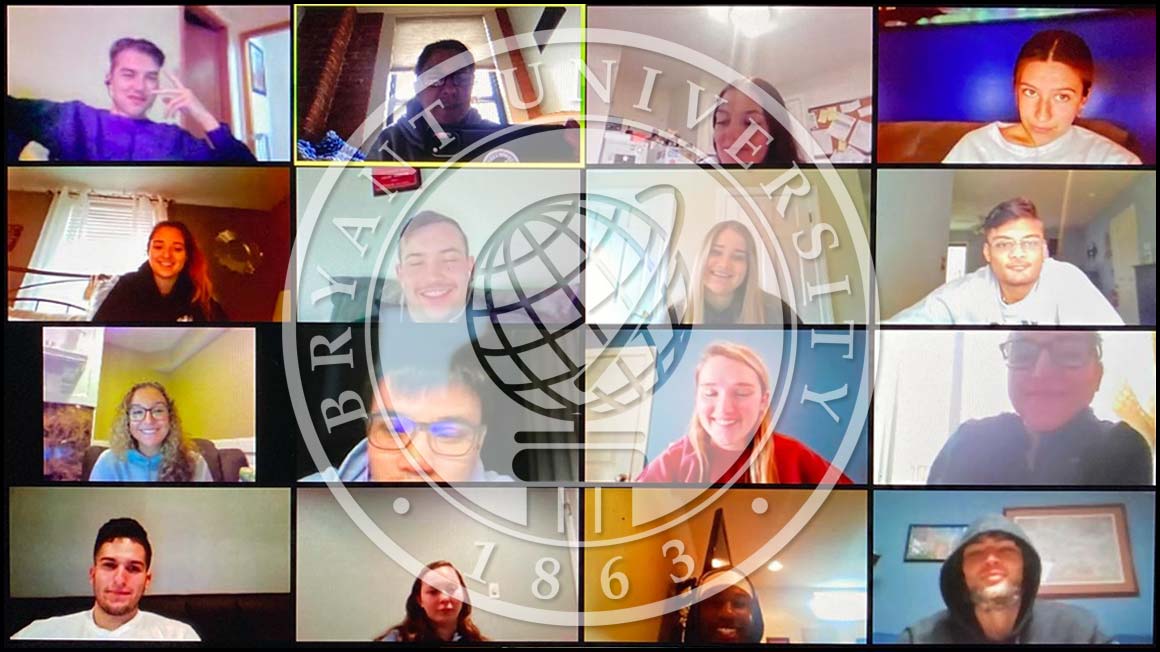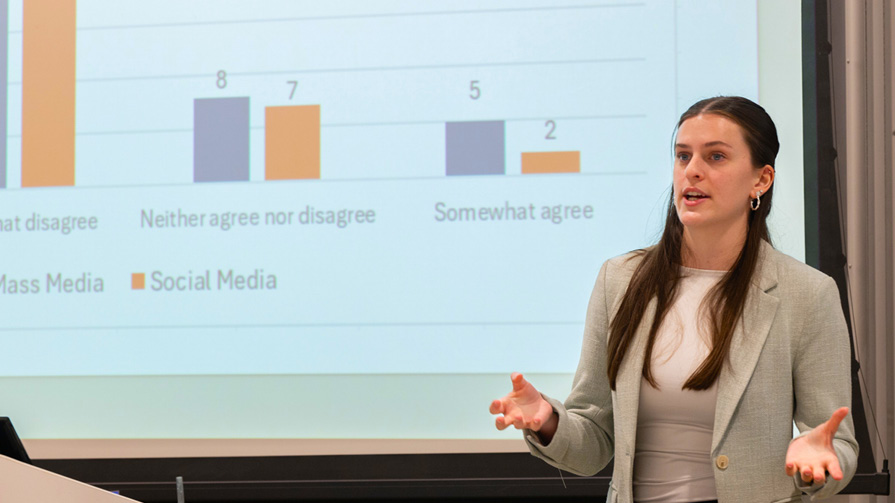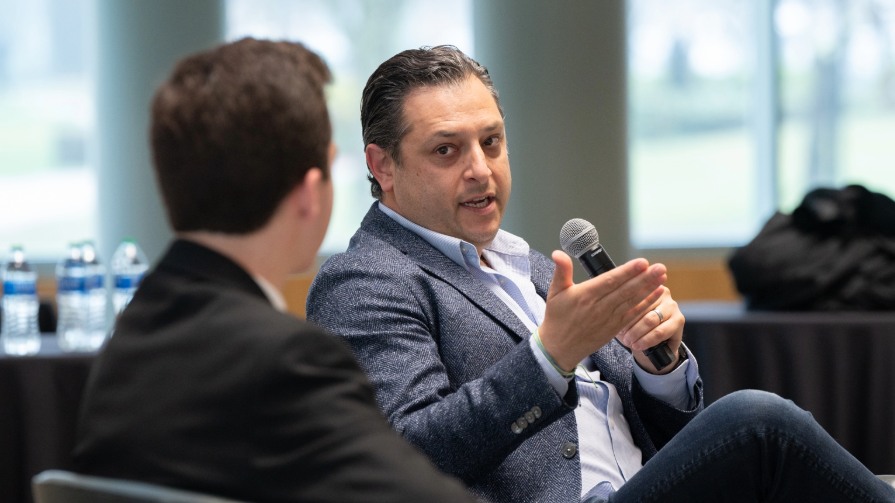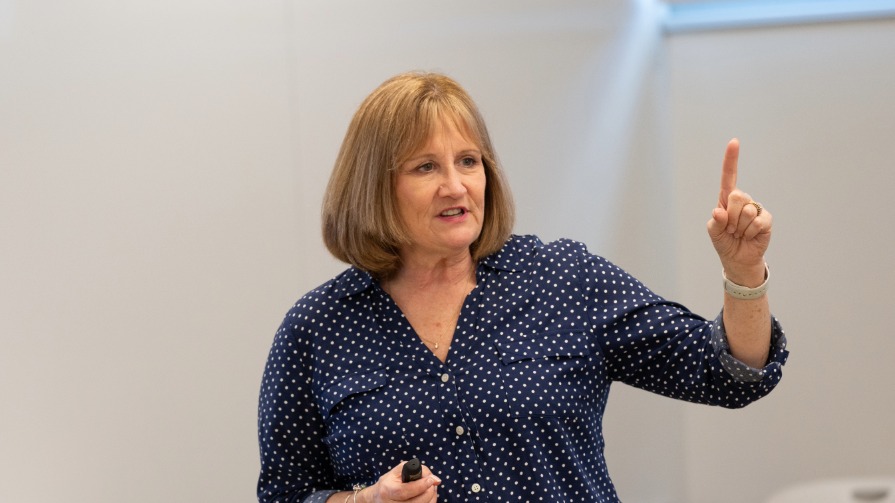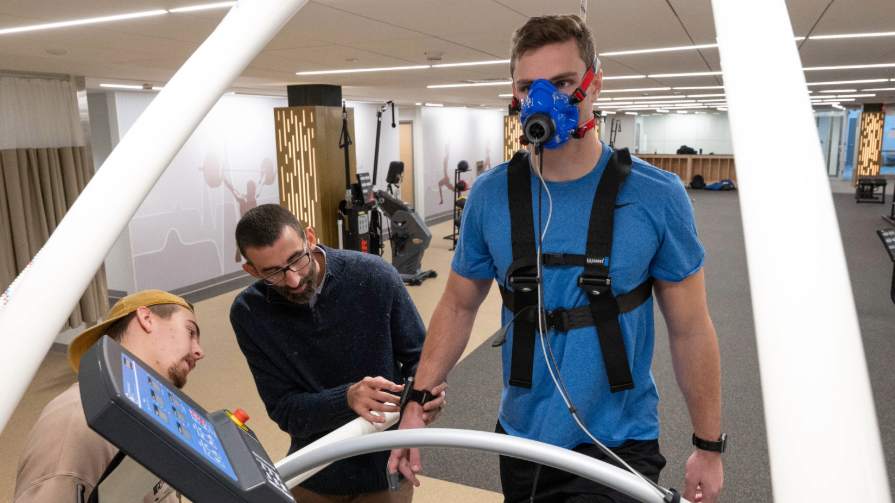Personal attention provided by mentoring faculty is a hallmark of the Bryant educational experience. Faculty say they thrive on the opportunity to teach and help their students. And Bryant students say their experiences with faculty consistently go beyond their expectations.
Now that Bryant has become a virtual campus, faculty have risen to the challenge, pivoting to recreate the Bryant learning experience with new methods while preserving the close connections with students that drive students to achieve their highest goals.
Faculty say the challenge is not as hard as they imagined, thanks to strong relationships that were well established. In addition, many say the circumstances stand to make their bonds stronger than they were before.
Here's how a cross-section of our faculty are embracing these challenging times as a unique opportunity for mentorship, while continuing to provide a personalized and impactful experience.
The elephant in the room
In challenging times, a strong student-faculty relationship, which is what keeps students engaged and motivated, means going above and beyond to connect with students about their new reality. Why? Says Kevin Pearce, Ph.D., Department Chair and Associate Professor of Communication, “If you ignore the environment and all that has happened, students won’t be able to focus. They are more worried than we are, and that has to be addressed and dealt with before you can effectively move forward. Once you touch base with them on this level, you can move on to teach the material of the course.”
Faculty say the challenge is not as hard as they imagined, thanks to strong relationships that were well established.
Faculty are finding ways to acknowledge the shift while providing guidance, whether in one-on-one discussions or gathered online with their students during class time. For example:
- Even in ordinary times, faculty often become surrogate parents, guides, and confidants to their students, says Michael Lynch, J.D., M.S.T., C.P.A., Professor of Accounting. Like many other faculty members, he's holding one-on-one chats with current and past students who are now uncertain about their academic and career plans.
- For one of her classes, Judith McDonnell, Ph.D., Professor of Sociology and Sport Studies Coordinator, held an FDR-style fireside chat to remind students of their strength and ability to persevere.
- In a heartfelt note sent to each of his students, Chris Roethlein, Ph.D. Professor of Management, noted how his life and his students' lives now have a common thread – they’re all dealing with disruption. He told them that he tends to look for opportunities that the new normal brings.
“We’re all in this together”
Faculty are assuring students that although circumstances may have changed, one-on-one mentoring and guidance hasn't vanished. Many report doubling their efforts to reach out. Says Dan McNally, Ph.D., Professor of Environmental Science, “I continuously take the opportunity to assure the students that we are all in this together […] I encourage each student to contact me at any time to discuss how they’re doing.”
The students are responding to such offers.“Because relationships with students were already well-established, students know that they can come to me at any time, and email me and say, can we jump on a Zoom call? Can we have a conference call, because I don't understand this,” says Mara Derderian, M.B.A., Lecturer of Finance. By the end of the first week of courses, faculty reported consistent communication with students, including numerous one-on-one virtual meetings to discuss a course, internships, recommendations, or insecurities about online learning.
Faculty "really go out of their way to try help you. ... This attitude has continued and improved even more during these difficult times."
George Gill ’20, a Global Supply Chain Management and Applied Analytics major and captain of the men’s soccer team, appreciates the efforts. “In my four years at Bryant, the main thing that always struck me was how much the professors want you to do well," Gill said. "They really go out of their way to try help you, by being very flexible […] This attitude has continued and improved even more during these difficult times. The professors have been more than patient and willing to help with our transition […] which I feel has made it a lot easier. The classes have continued to be engaging, with students being encouraged to participate – it's what makes Bryant classes what they are!”
Iterating and adapting with technical tools
Technology has helped the faculty be innovative as they adapt their courses to a fully-digital experience.
- Small virtual chat rooms: Students of Patricia Gomez, M.A., Senior Lecturer of Modern Language, practice speaking Spanish; students of Ilisabeth Bornstein, J.D., M.P.P., Lecturer in Legal Studies, take part in role-playing of legal concepts. Each professor is able to drop in on each chat room to see and hear how the students' discussions are proceeding
- Kirsten Hokeness, Ph.D., Department Chair and Professor of Science and Technology, and Stephanie Mott, Ph.D., Lecturer of Science and Technology, send videos of experiments to their students for analysis, interpretation, and graphing. In a lab on genetics, for example, students use 10 coins in a bag, where two different sides of the coins will stand in for two different alleles of one gene, and use a Zoom participation tool to count the distribution of phenotypic traits.
- Students in Roethlein’s Global Supply Chain practicum use the same video conferencing tools used by their corporate clients.
- Lori Coakley, Ph.D., Professor of Management and Allison Butler, Ph.D., Associate Professor of Psychology, who co-teach Advanced Design Thinking, redeveloped their course so that students could use the Share Whiteboard app on Zoom to do storyboarding, and Zoom rooms for brainstorm sessions.
- Much like a sports coach watches game film, Kacy Kim, Ph.D., Assistant Professor of Marketing, mentors a student group participating in Google’s Online Marketing Challenge by watching the online meeting video recordings of the students and their client, a nonprofit organization.
